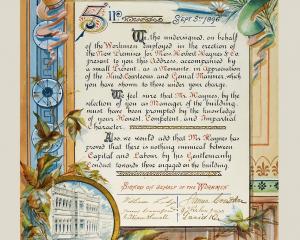Comic puppet opera comes to Otago for the first time. Bruce Munro talks to baroque music and puppet aficionado Jonathan Cweorth about this afternoon's two Dunedin shows.
King Arthur, opera and puppets. Of course.
No, wait. What? Why?!
Jonathan Cweorth is seated behind a wooden table upcycled as an office desk.
All around him, filling much of the half-lit room, are signs of a busy, creative life.
Folding dressing screens, shelves bulging with thespian paraphernalia, a puppet stage reaching for the high ceiling ...
It is from here, in the bowels of the Carnegie Centre, in Moray Pl, that Cweorth has dreamed, schemed and created what he believes to be a theatrical first; a puppet-led retelling of what has been described as the Western world's first musical, English composer Henry Purcell's semi-opera, King Arthur.
"I think I'm inventing puppet opera,'' Cweorth says with a smile.
"I'm not aware of any other attempts to rewrite the dramatic libretto of King Arthur ... It's quite unusual to have any sort of operatic performance with this combination of spoken and sung text.''
Cweorth is a creator and director of community arts projects.
It is a niche he has been carving out for himself during the past seven years.
In the mix is an annual midwinter puppet show, which he has directed for several years.
"This year, I wanted to advance the show by picking one story that would fill the whole show and would include a number of different puppetry styles,'' Cweorth says.
He hit on the idea of taking one of Purcell's baroque semi-operas, first performed in 1691, and adapting it for use as a piece of 21st-century puppet theatre.
"King Arthur is particularly well-suited to that. It's unusual for an opera as we know it, because it contains major spoken parts for actors and minor parts for singers. That's because in Purcell's day the British audience couldn't stomach too much singing. They expected to have a drama; lots of spectacle, lots of things going on.''
Purcell's story is not the romantic medieval French version of King Arthur with which most people are familiar.
His is more of a Dark Ages tale; a British King Arthur fighting the Saxon King Oswald for control of Britain, Cweorth says.
Both kings have a magician, but Guinevere, Lancelot and Excalibur are all missing.
King Arthur's love interest in this older story is a blind Cornish noblewoman called Emmeline.
What King Arthur: a puppet opera also has is humour.
"Opera of this period wasn't as serious as it later became. They didn't have consistently tragic or romantic themes. Those things were in there, but the audiences also seemed to like a bit of slapstick and dancing; bung some shepherds in there if you could ... A bit of everything really.''
Cweorth removed about half of the original opera's vocal music, while "keeping all the best bits in'', so that the whole production would be just under an hour.
"I've taken the skeleton of Purcell's plot, streamlined it a bit and added my own linking text between the arias. But we've kept Purcell's music and most of the words to the songs.''
The music features some of Purcell's finest pieces, including the Cold Song and Fairest Isle.
In the past, people have adapted the opera, usually by taking out the spoken roles and performing the music. This is the first time Cweorth is aware of that the spoken text has been rewritten, let alone rewritten for puppets.
Today's performances are being staged by puppeteers from the Dunedin Medieval and Renaissance Society.
Most of the show is done with glove puppetry, although one scene uses shadow puppets.
"That is the scene when Arthur is lost in an enchanted forest and is being tempted by naked nymphs, which is easier to do with shadow puppets.''
The lavish costumes are by Charmian Smith.
The Rare Byrds Early Music Consort and Chorus is performing the songs.
The two soloists are mezzo-sopranos Ana Good and Janet Rountree.
"The soloists wear masks. They and the chorus, in effect, take dramatic roles because all the music advances the story.''
Accompanying the singers is a three-person instrumental ensemble.
They will play Renaissance instruments, the spinet (a small harpsichord) and cello-sized bass viol, and a medieval nyckelharpa (a cross between a violin and a keyboard).
An enduring fascination with the culture and arts of medieval and Renaissance Europe is the driving force behind this production of King Arthur, Cweorth admits.
"It was very much a period in which people freely adapted what they had, like the King Arthur story, to whatever forces, instrumental or theatrical, were available. I absolutely love the music of the period.
"The puppet shows are a way to present early music to a wider audience ... It deserves to be heard by a wide audience.''
The show
• King Arthur: a puppet opera is on today, at noon and 2pm, in the Dunedin Public Art Gallery auditorium. Entry by koha/donation.












